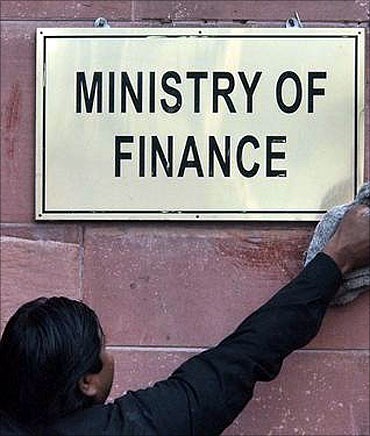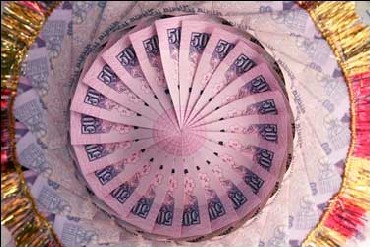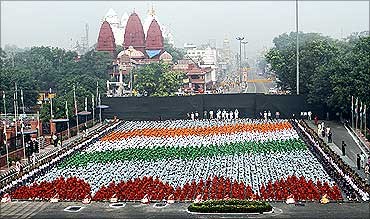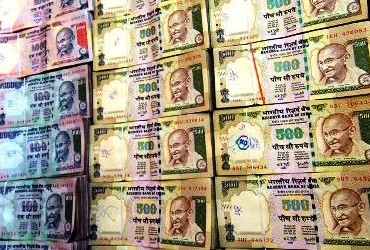A K Bhattacharya in New Delhi
Finance ministry officials are still optimistic that they will be able to rein in the Union government's fiscal deficit for the current fiscal year to the budgeted level of 4.6 per cent of gross domestic product (GDP).
Is this pure optimism or a simple case of over-confidence? A quick assessment of the ground reality will tell you that it is a reflection of the finance ministry's mistaken faith in factors beyond its control.
Finance Minister Pranab Mukherjee had made four key assumptions while setting a fiscal deficit target of 4.6 per cent for the current year, compared to 5.1 per cent of GDP in 2010-11. One, he had hoped for a GDP growth rate of nine per cent.
Make no mistake that this was a critical assumption. Now that signs of an economic slowdown are unmistakably evident, not only is the growth estimate for 2011-12 likely to be revised downwards, the government's tax revenue growth projections too will suffer a blow, upsetting the fiscal deficit estimates.
...
The truth behind finance ministry's fiscal mess
Photographs: Reuters
If you thought that the finance minister could absorb the impact of a shortfall in tax revenue collections by simply squeezing expenditure, you are likely to make another error of judgement.
This is because in his desire to reduce the fiscal deficit for the current year, Mr Mukherjee had allowed only a measly rise of three per cent for the government's total expenditure in the current year over the revised estimate for 2010-11.
With such low expenditure growth budgeted for the current year, Mr Mukherjee will have hardly any scope for a further cut in expenditure. If any reduction is possible, it will unfortunately be in the area of capital expenditure.
That would be a double blow - one for the fiscal deficit reduction plan and the other for the plan to spend more in areas to build capital asset. The problem will aggravate since there are no signs of any reduction in the government's revenue expenditure.
That brings us to the second critical assumption made by Mr Mukherjee in the Budget for 2011-12.
...
The truth behind finance ministry's fiscal mess
Photographs: Reuters
The finance minister had made no provision to meet the rising subsidy burden in the hope that the government would be able to introduce a cash transfer scheme for the various subsidy schemes using the much-vaunted unique identification programme of Nandan Nilekani.
However, the estimates of the availability of an adequate number of biometric identities by September, which would have made it possible for the government to kick-start the cash transfer scheme and thereby check the subsidy bill, have gone awry.
It was not a question of just keeping a check on subsidies. While presenting Budget 2011-12, the finance minister was confident of reducing the government's subsidy bill by more than 12 per cent.
No other finance minister in recent times has either projected such a cut or come anywhere close to achieving such a reduction. If the current developments are any indication, Mr Mukherjee will not be an exception to the past trend. That will be yet another blow to the government's estimates for fiscal deficit.
...
The truth behind finance ministry's fiscal mess
Thirdly, Mr Mukherjee's calculations on the need to compensate the oil marketing companies for their under-recoveries show a gross underestimation.
The Rs 20,000 crore (Rs 200 billion) provided in the current year have already been used to meet the oil marketing companies' under-recoveries in the fourth quarter of 2010-11.
The first quarter of the current financial year will end in another two weeks. And after showing some courage in going ahead with a Rs 5-increase in petrol prices, the government has suddenly developed cold feet over its proposal to effect similar increases in the prices of diesel, kerosene and liquefied petroleum gas.
No one knows by when the government will muster the courage to increase the prices of these commodities.
...
The truth behind finance ministry's fiscal mess
Given the current trend of international crude oil prices, and if we assume that the government fails to address the oil sector's pricing concerns, the total under-recoveries of oil marketing companies in the whole of 2011-12 will be Rs 1.65 lakh crore.
One third of this burden is to be shared by the upstream oil companies like ONGC and Oil India.
Oil marketing companies are expected to share only about five per cent of this burden, thus leaving an under-recovery gap of about Rs 1 lakh crore (or a little more than a per cent of GDP) to be met by the Union government. In other words, the finance ministry may have to provide for this amount, which will stretch its fiscal deficit by a percentage point.
There is yet another area of concern. The finance minister had projected receipts of about Rs 40,000 crore (Rs 400 billion) from disinvestment of government equity in public sector undertakings (PSUs).
...
The truth behind finance ministry's fiscal mess
Last year, when the stock markets were in better shape, the government could meet only half its target by raising about Rs 22,000 crore (Rs 220 billion).
With the markets showing no sign of any extra appetite for PSUs' shares, it is doubtful if the government would be able to achieve even last year's figures through disinvestment.
Undeniably, there are many downside risks in the finance ministry's revenue projections. Also, there is a strong likelihood of its expenditure on subsidies, including the demands for meeting the oil sector's under-recoveries, exceeding the Budget estimates.
The question then is whether the finance ministry's optimism about sticking to the fiscal deficit target is a sign of its foolhardiness or a simple refusal to recognise the reality. In either case, the finance ministry needs to do some deep introspection.







article